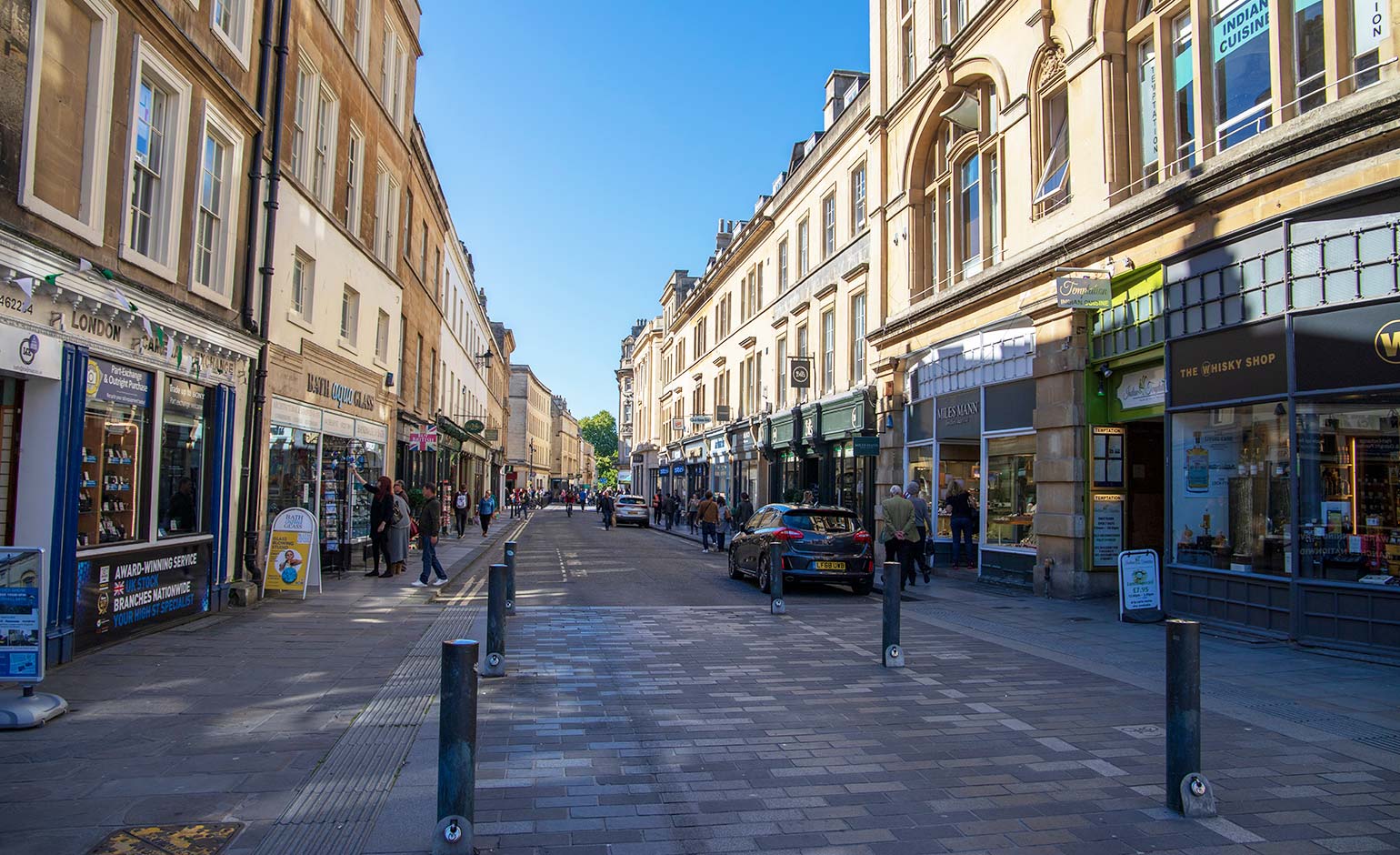More than 500 consultation responses have been received on plans to permanently strengthen security in the centre of Bath, with B&NES Council looking set to go ahead with the proposals.

Cheap Street in Bath | Photo © ColinPeachey / Shutterstock.com
Following the consultation, Bath & North East Somerset Council and Avon & Somerset Police have re-emphasised the need for “robust measures to reduce the risk of terrorism in the city”.
The controversial plans would see permanent static bollards installed on streets such as Burton Street and Old Bond Street, Barton Street, Westgate Buildings, Beau Street and Southgate Street.
Sliding bollards would also be introduced on York Street, Cheap Street, Upper Borough Walls, Lower Borough Walls and Hot Bath Street.
On-street disabled spaces in the city centre would be removed, and delivery services including food, parcels and other goods will not have access to properties within the strengthened zone.
The local authority says the proposed security measures are to keep the city’s crowded streets and spaces safe from the threat of terrorism though some residents have called the plans “draconian” and “deeply unfair”.
Speaking recently, the Abbey Residents’ Association said: “Anyone living in this area will be essentially trapped unless they are able to walk, cycle or use mobility vehicles to reach shops and other facilities including blue badge and general-purpose parking areas.”
There were calls at the end of January to put the proposals on hold.
Chief Constable of Avon and Somerset Police, Andy Marsh, said: “Counter Terrorism Security Advisers (CTSAs) have been working with Bath & North East Somerset Council for many years on a package of measures which enhance security in Bath and which help to prevent potential terror attacks.
“Recently, our CTSAs asked the council to put in proportionate measures to protect areas of the city which attract high footfall during peak times.
“I’d like to reassure people the request isn’t based on any specific intelligence relating to any threat to the city but is based on the known national risk of terrorism and that crowded places are potential targets.
“We understand integrating these protective security measures is a significant challenge but we support the proposed plans as we feel they better protect the many hundreds of thousands of people who live, work and visit the city every year.
“As ever, our long-standing advice for people is to always remain vigilant, be alert to any suspicious activity and to contact us with any concerns.”
Councillor Joanna Wright, joint cabinet member for Transport Services, added: “I’d like to thank everyone who took part in the consultation and I want to reassure people that we will listen to businesses and residents and especially people with restricted mobility.
“However, I am also asking people to understand the rationale behind the proposed restrictions. We know from experience that the crowded spaces and places where so many of us live, work and enjoy are the very places that could be targeted.
“Although the national terrorist threat level was recently reduced from severe to substantial, that still means that a terrorist attack in the country is likely and the threat level could change at any time, so we are duty-bound to respond to the police advice.
“This means the safety and security of the city centre is something we have to take very seriously and cannot ignore. We accept the proposals put forward do impact on people’s everyday lives but we will work with residents, business and disability groups to mitigate against these as much as we can.
“Our next steps involve working with an access specialist to listen to local groups, and other key local stakeholders including The Abbey Residents’ Association.
“We have already had a constructive meeting with the Federation of Bath Residents Associations (FOBRA) and I want to thank FOBRA for meeting councillors and officers to collectively consider the importance of making the city as safe as possible.”
An adviser from The National Register of Access Consultants (NRAC) will now review the responses received from the consultation on the measures which are for the prevention and protection from hostile vehicles.
The adviser will also work with the B&NES Independent Equalities Advisory Group (IEAG) and the Active Travel and Accessibility Forum (ATAF).
Alongside this, views will be gathered from a panel representing members of the community and local accessibility organisations, organised by the council’s equalities team.
Together they will then recommend a package of measures to mitigate the impact of the scheme.
The proposed scheme includes:
- Vehicle access restrictions 24 hours every day of the year within the city centre’s most crowded streets.
- Strengthened secure vehicle access points controlled by the Council’s CCTV control room.
- New purpose-designed reinforced static and sliding protective bollards and furniture.
PCC Sue Mountstevens added: “Along with the Chief Constable, I want to reassure local people that these proposed changes are not based on specific intelligence relating to a terrorist threat to the city.
“Instead, the plans are a result of years of partnership working between the CTSAs and local council to ensure proactive, protective measures are in place to keep both local people, visitors and businesses safe.
“I know these plans propose big changes for Bath city centre, but it is important that we listen to the CTSAs and continue to put our community’s safety first. I encourage local people to work alongside the council regarding these plans to ensure your voice is heard.”
Councillor Wright concluded: “Following the 2017 Manchester Arena the government has been asked to consider Martyn’s Law which has five requirements, one of which is for local authorities to plan for the threat of terrorism and sadly that is what we have to do.
“A final report will be made available in the spring and there will be a further opportunity to comment on final proposals later this year when the traffic regulations orders are advertised.
“I encourage people to check the project webpage for updates at www.bathnes.gov.uk/citycentresecurity.”



